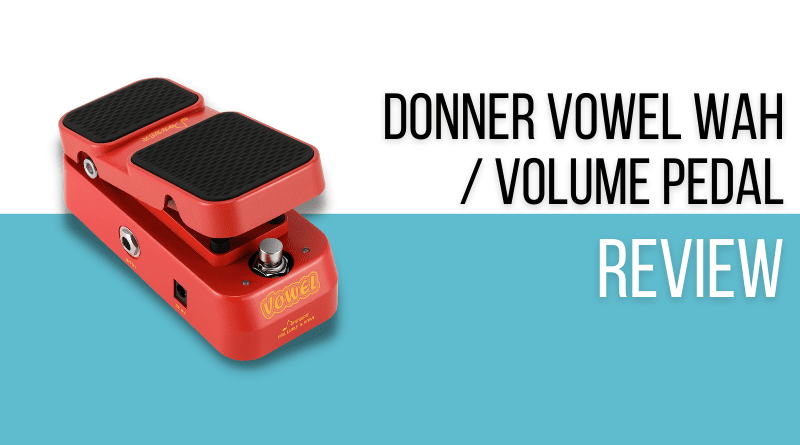Donner is continuing to bombard the market with pedals of all types, including expression pedals like the Donner Vowel Wah and Volume. The Vowel is a compact (and cheap) wah and volume pedal, which quickly piqued our interest, but the question remained – is it any good? You’re not going to want to miss this one, keep reading to discover what we learned.
Read more about our review process.
Want to learn more about guitar pedals?
Check out our ultimate guide to guitar pedals to find more jumping off points.
Contents
Who Is this for?
The Donner Vowel is an entry level wah pedal with built in volume control, and it’s mostly aimed at beginners to intermediate level players who are wanting to start experimenting with expression pedals and more varied FX. For reasons explained later in this review, it’s not a pedal for advanced guitarists.
Appearance / Features / Controls
Unlike the rest of the Donner pedals we’ve reviewed, the Vowel is entirely made from plastic, from the housing down to the moving parts. It’s a cool looking unit, finished in a pretty unique bright red color.
On the foot rest of the pedal there’s a black rubber pad that provides protection for the housing and grip to prevent your foot from slipping off.
The only control on the unit is the toe switch that switches it from wah to volume and back. There is no bypass on the Vowel, so when we wanted clean tones, we had to switch to volume, and leave it maxed.
Performance/Sound
We tried out the Donner Vowel in a few situations – first up was straight from the pedal to the interface with a clean amp setting. While working the wah we did manage to get it talking, and considering the low price, it sounded great.
We tried all the usual techniques, including cowboy chords, barre chords, raking the strings, and soloing, all using varying degrees of foot movement on the pedal. With slight movements, the effect was nice and subtle, while with large movements, it was much more apparent. We liked seeing that it wasn’t the pure binary “on/off” effect that we feared it might be at the price.
We also tried leaving it cocked in the mid frequency range, too, but it was a little disappointing here. This is a technique that’s usually employed to help cut through a mix during solos (it’s a favorite trick of Slash), but with the vowel, we found that the mids were pretty muddy, making this trick basically redundant.
Not having any kind of bypass was also a challenge. Even when maxed out in volume mode, the volume was significantly lower than the pure dry signal with no other changes to the EQ on the guitar or at the amp. The volume mode itself was a really nice feature, though. It gave a great sweep from silence to full volume, although as stated, it did kill the level quite noticeably.
When paired with a Donner White Tape delay pedal, and a Boss SD-1 Super Overdrive respectively, the Vowel behaved in an ear pleasing and predictable manner. The level control on both pedals actually helped to increase the volume, too.
The primary reason that we’d suggest that advanced guitarists look elsewhere is the build quality. The rocker part of the pedal does OK in a bedroom setting, but it’s definitely not built to withstand the rigors of gigging.
There was some unwanted lateral motion when using the pedal, which will almost certainly lead to stress cracks. Additionally, after a few hours of use, the pedal developed a squeak when being manipulated, so if you were hoping to mic an amp in order to record while using this pedal, you’ll have squeaking to deal with.
Check out our no talking demo on the Killer Guitar Rigs YouTube channel to hear how it sounds for yourself!
Final Thoughts on the Donner Vowel Wah and Volume Pedal
Despite the flaws, we still think the Donner Vowel Wah and Volume pedal is a great choice for beginners to start experimenting with this fun effect. As long as you’re aware of the limitations of the pedal, you’ll enjoy getting to play with it.
It performs well with other pedals in a chain, and having the option of both wah and volume control in the same pedal provides a huge amount of flexibility, from choppy solos with the wah, through to sweeping ethereal soundscapes with the volume control paired with reverb or delay pedals.
Looking for more Donner gear? Check out:


